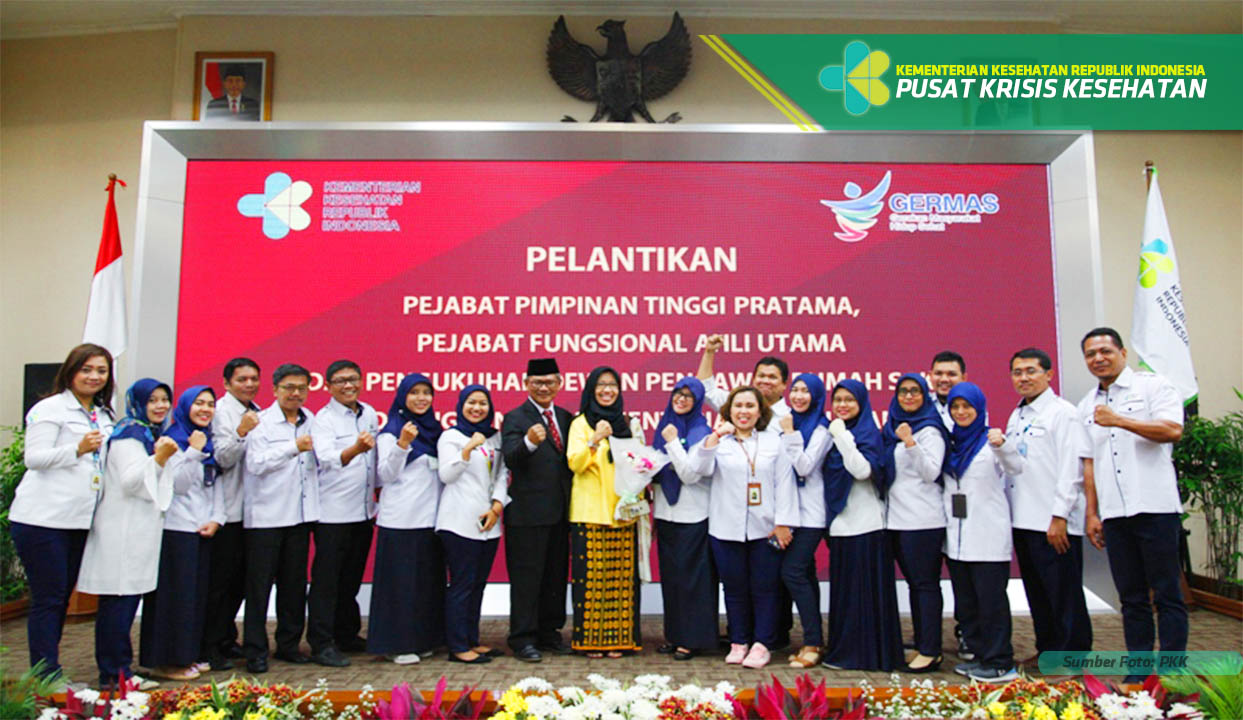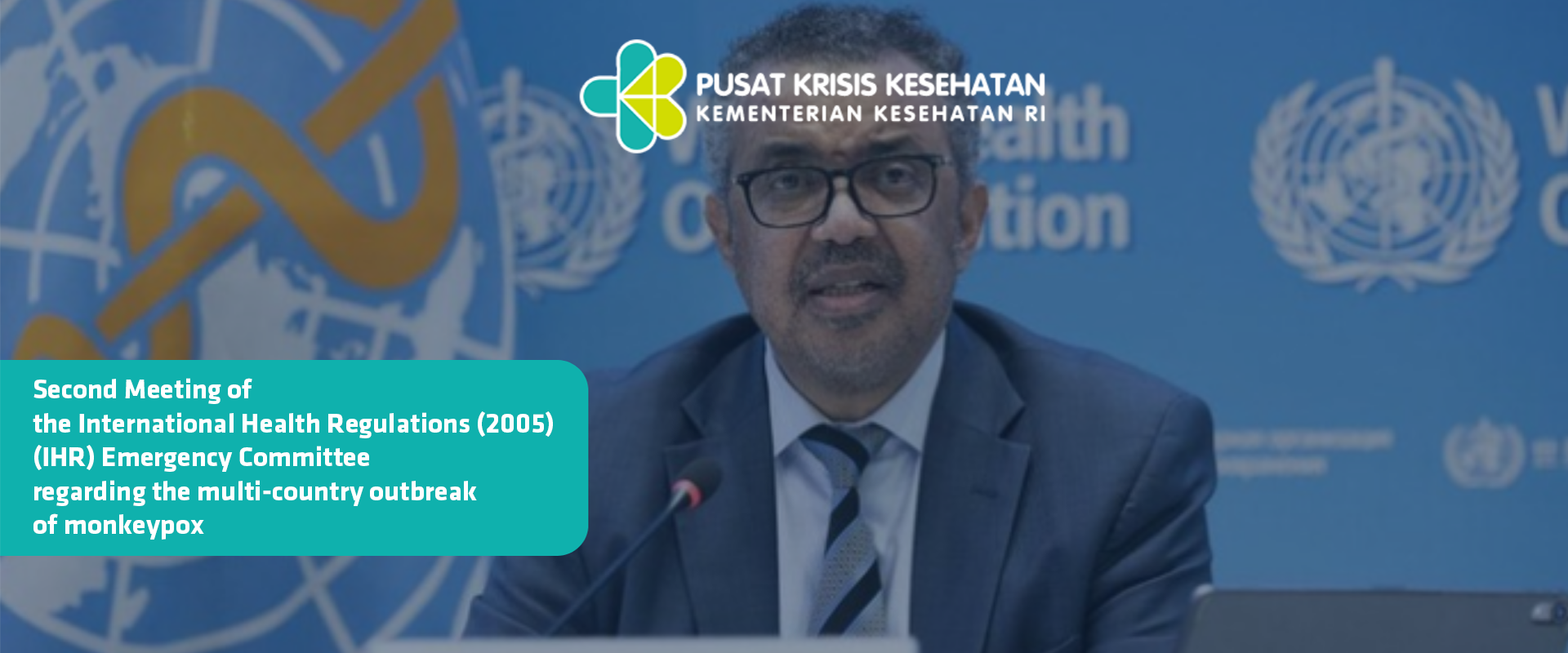The Indonesian Minister of Health, Prof. Dr. dr. Nila Farid Moeloek, Sp. M (K) on August 1, 2019, inaugurated the Primary High Leader, the Main Expert Functional Officer and the Inauguration of the Hospital Supervisory Board at the Ministry of Health. One official who was appointed as Secretary-Director General of Disease Prevention and Control (Sesditjen P2P) dr. Achmad Yurianto, who was previously the Director of The Health Crisis Center (PKK) of the Ministry of Health.
dr. Achmad Yurianto, who used to have a career as an officer at the Indonesian Army, was appointed as Director of the Center for Health Crisis Management at the Ministry of Health as Head of Center for Health Crisis Management on October 17, 2014. Then with the Minister of Health Regulation No. 64 of 2015 concerning the new organization and work arrangement of the Ministry of Health, he was re-appointed as the Director of The Health Crisis Center on January 7, 2016, until his appointment as the new Sesditjen P2P.
During his leadership, the PKK underwent a restructuring and new organizational management according to Permenkes No. 64 of 2015, which can run smoothly. Along with this, the PKK carried out a program of strengthening 170 Disaster / City Regencies in stages over 3 years in the form of regional capacity assessments, assistance in preparing response maps, contingency plan preparation, Table Top Exercise, and field simulation exercise.
The role of the PKK in coordinating national health clusters and accompanying regional health clusters during a health crisis also appears to be strong in his leadership so that health crisis management can be done more quickly and comprehensively, such as landslides in Banjarnegara, flash floods in Bima, Measles outbreaks in Asmat, the earthquake in Lombok, the earthquake and Tsunami in Central Sulawesi, the Sunda Strait Tsunami, major floods in South Sulawesi, and many others.
He is also very concerned about the development of the Health Crisis Management Information System (SIPKK) and the infrastructure that supports the SIPKK because he is aware that good information and infrastructure systems are needed to support leaders in making better decisions during health crises. Likewise in the formulation of future health crisis management policies that can be seen from the health crisis profile data that already exists in SIPKK.
We congratulated to dr. Achmad Yurianto, hopefully in the future we can work more closely together.
The Indonesian Minister of Health, Prof. Dr. dr. Nila Farid Moeloek, Sp. M (K) on August 1, 2019, inaugurated the Primary High Leader, the Main Expert Functional Officer and the Inauguration of the Hospital Supervisory Board at the Ministry of Health. One official who was appointed as Secretary-Director General of Disease Prevention and Control (Sesditjen P2P) dr. Achmad Yurianto, who was previously the Director of The Health Crisis Center (PKK) of the Ministry of Health. dr. Achmad Yurianto, who used to have a career as an officer at the Indonesian Army, was appointed as Director of the Center for Health Crisis Management at the Ministry of Health as Head of Center for Health Crisis Management on October 17, 2014. Then with the Minister of Health Regulation No. 64 of 2015 concerning the new organization and work arrangement of the Ministry of Health, he was re-appointed as the Director of The Health Crisis Center on January 7, 2016, until his appointment as the new Sesditjen P2P. During his leadership, the PKK underwent a restructuring and new organizational management according to Permenkes No. 64 of 2015, which can run smoothly. Along with this, the PKK carried out a program of strengthening 170 Disaster / City Regencies in stages over 3 years in the form of regional capacity assessments, assistance in preparing response maps, contingency plan preparation, Table Top Exercise, and field simulation exercise. The role of the PKK in coordinating national health clusters and accompanying regional health clusters during a health crisis also appears to be strong in his leadership so that health crisis management can be done more quickly and comprehensively, such as landslides in Banjarnegara, flash floods in Bima, Measles outbreaks in Asmat, the earthquake in Lombok, the earthquake and Tsunami in Central Sulawesi, the Sunda Strait Tsunami, major floods in South Sulawesi, and many others. He is also very concerned about the development of the Health Crisis Management Information System (SIPKK) and the infrastructure that supports the SIPKK because he is aware that good information and infrastructure systems are needed to support leaders in making better decisions during health crises. Likewise in the formulation of future health crisis management policies that can be seen from the health crisis profile data that already exists in SIPKK. We congratulated to Mr. dr. Achmad Yurianto, hopefully in the future we can work more closely together.
The Indonesian Minister of Health, Prof. Dr. dr. Nila Farid Moeloek, Sp. M (K) on August 1, 2019, inaugurated the Primary High Leader, the Main Expert Functional Officer and the Inauguration of the Hospital Supervisory Board at the Ministry of Health. One official who was appointed as Secretary-Director General of Disease Prevention and Control (Sesditjen P2P) dr. Achmad Yurianto, who was previously the Director of The Health Crisis Center (PKK) of the Ministry of Health. dr. Achmad Yurianto, who used to have a career as an officer at the Indonesian Army, was appointed as Director of the Center for Health Crisis Management at the Ministry of Health as Head of Center for Health Crisis Management on October 17, 2014. Then with the Minister of Health Regulation No. 64 of 2015 concerning the new organization and work arrangement of the Ministry of Health, he was re-appointed as the Director of The Health Crisis Center on January 7, 2016, until his appointment as the new Sesditjen P2P. During his leadership, the PKK underwent a restructuring and new organizational management according to Permenkes No. 64 of 2015, which can run smoothly. Along with this, the PKK carried out a program of strengthening 170 Disaster / City Regencies in stages over 3 years in the form of regional capacity assessments, assistance in preparing response maps, contingency plan preparation, Table Top Exercise, and field simulation exercise. The role of the PKK in coordinating national health clusters and accompanying regional health clusters during a health crisis also appears to be strong in his leadership so that health crisis management can be done more quickly and comprehensively, such as landslides in Banjarnegara, flash floods in Bima, Measles outbreaks in Asmat, the earthquake in Lombok, the earthquake and Tsunami in Central Sulawesi, the Sunda Strait Tsunami, major floods in South Sulawesi, and many others. He is also very concerned about the development of the Health Crisis Management Information System (SIPKK) and the infrastructure that supports the SIPKK because he is aware that good information and infrastructure systems are needed to support leaders in making better decisions during health crises. Likewise in the formulation of future health crisis management policies that can be seen from the health crisis profile data that already exists in SIPKK. We congratulated to Mr. dr. Achmad Yurianto, hopefully in the future we can work more closely together.


.png)






